 Overseas Chinese in UK Overseas Chinese in UK
 Fact: Census data put Chinese in Great Britain at almost 500.000, a single digit among the total population, not counting those of partial Chinese ancestry. Approximately two thirds speak Cantonese as a first language, a quarter Mandarin, and Hakka completes the list. The preeminence of Cantonese is easily explained by Britain's long occupation of Hong Kong (Handover to China in 1997); it is furtherbolstered by emigration of oversea Chinese from its empire in southeast Asia and the Indian Ocean. Furthermore with fresh arrival of Chinese from China itself and the robustness of China's economy, the use of Mandarin will slowly overtake the importance of Cantonese. Fact: Census data put Chinese in Great Britain at almost 500.000, a single digit among the total population, not counting those of partial Chinese ancestry. Approximately two thirds speak Cantonese as a first language, a quarter Mandarin, and Hakka completes the list. The preeminence of Cantonese is easily explained by Britain's long occupation of Hong Kong (Handover to China in 1997); it is furtherbolstered by emigration of oversea Chinese from its empire in southeast Asia and the Indian Ocean. Furthermore with fresh arrival of Chinese from China itself and the robustness of China's economy, the use of Mandarin will slowly overtake the importance of Cantonese.
On the other hand, English as a first language seems to have been not well documented. Still, the collection and analysis ofl demographic data, tell us that 29 per cent claim birthplace in Hong Kong,20 per cent in British isles, 8 per cent China, and less than 4 per cent in deminishing degrees from Malaysia, Vietnam, Singapore, Mauritius, and Taiwan.
Fact. Chinese are in the main urban dwellers. An educated guess, based on 2005 estimations, allows for the largest concentration in London 110.000 [1,4 per cent]; Manchester 10.800 [2,3%]; Birmingham 10.700 [1,1%]; Liverpool 6.800 [1,5%];Sheffield 5.100 [1%]; Oxford 4.200 [2,9%]; Cambridge 3.600 [3,1%]; and Newcastle on Tyne 3.100 [1,1%].
The prevalence of port cities, a quick glance at British colonial history, simply reveals the first Chinese emigrants worked on sailing vessels and coal fired ships. British 'opium wars' brought to its shores large waves of wayfarers of Cantonese speaking speakers and enterpising men who formed the nucleus of permanent residents in the United Kingdom.
The steady stream of Chinese accelerated after World War 2, as its empire withdrew its hold on far flung colonies, augumented by an influx of rural Chinese with limited skills. The flow waxed stronger by Chinese from Malaysia and Singapore during the 1950s and beyond. Add the waxing number of Chinese, sturdents who sought university and professional training, many of whom did not return home.
Chinatowns still are centres of active Chinese life, although in today's 21 century, fewer and fewer Chinese live there, thanks to rising standards of living and a more comfortable feeling of 'fitting in' the British family.
Chinatowns are found in major British cities---in London, Birmingham, Manchester, Liverpool, Newcastle, Sheffield, Belfast, and Aberdeen.They owe their existence to the need of the huddling together of Chinese, offering a language they could understand, an island of protection and safety, opportunities for business and employment—in particular, restaurants, food emporia, and social services---as an introduction to a society in less populous land in which they barely spoke the language, understood the mores, They offered a variety of community services in health, in English classes, legal advice.
They also tended to the preservation and maintenance of Chinese traditions and religion, and the defence of spoken and written Chinese, mainly Cantonese. Nor did they scant the love of entertainment and tea shops and an outlet for a predominently male society.
Chinatowns to the non Chinese become objects of curiosity, of 'orientalism' and all the impossible dreams that that idea inspired, of the danger of gangs and hatchmen, and a source of opium inspired dreams. [See, Limelight Chinatown]. Today, Chinatowns are common places for tourists or for reasonably priced food, for annual Chinese New Year parade, souvenirs, etc. Newer waves of emigration give new meaning to their survival, for almost two hundred years, they are well practised in ushering in the new arrival into a seeming alien environment.
Fact. In spite of Britain's long relations with Hong Kong and China, and despite a small, but growing and economically Chinese presence, until quite late in the 20 century, the law discouraged and raised barriers to Chinese emigration, as well as obtaining British nationality.
The immediate effect of such a policy bred a climate of fear, fostered a decided penchant for non exercising the rights of citizens and actively feeling part of the larger British community. It helps to explain why Chinese have a low voting rate, and tend to abstain from rights that are theirs.
The ambiguous status of British Hong Kong passport holders, has fueled the pot of anxiety, the more especially since it concerns the less than full rights for British born or naturalised citizens; raises the legal right to residency in the United Kingdom;and can encourage social and civil explotation and nuturing extra legal organisations which do not hesitate to exploit this 'class of British Chinese'.
Fact. On the whole, British Chinese are noted for hard work, insistance on education and self improvement, and rapid socio economic advancement. Still, statistics show that many still engage in 'traditional occupations' in catering and take out trade, food emporia, import and export, community services, small businesses, supplemented by construction, and entrance into education, the law, accountancy, and banking.
As the economic and political clout of China increases, so do opportunities for British Chinese in a variety of ways for latching on to the favours British Chinese from the standpoint of language, decoding unexpressed cultural language, reading the signposts of common profit which cannot but profit the United Kingdom.
Even though Chinese in Britain remain a small segment of the population, they are represented in all facts of professional life. In journalism, in television and cinema, in the arts, in the world of business and finance, as noted above, in education. Relatively speaking, compared to their numbers, they stand out in mathematics, the sciences, and in Oxbridge.
Widely dispersed as a group in the United Kingdom, and despite low numbers, they remain a vibrant part of a changing British mosaic.
Article contributed by Dr. Jak Cambria
Related articles:
|
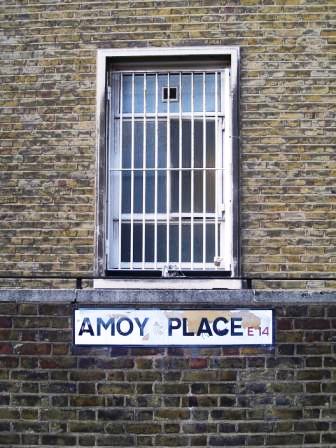

Monument to the Chinese who were forced to
leave UK after the war.
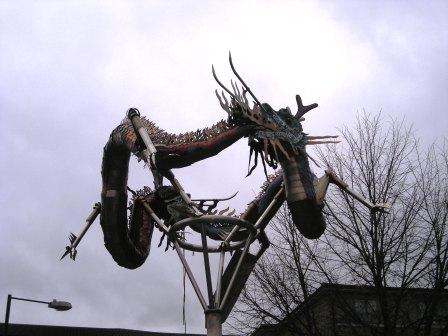
A pair of tin dragon sculpture, Limehouse Chinatown

Names of Chinese sailors who served in the British Navy
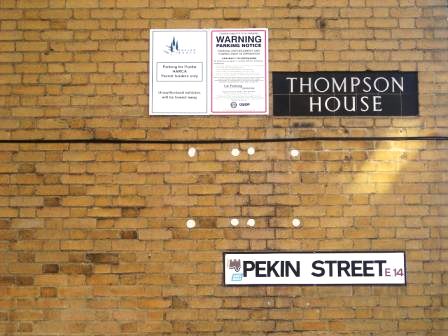
Memories of Lime House Chinatown

Photos of Overseas chinese in UK
displayed during Chinese New Year celebration in
Liverpool Chinatown
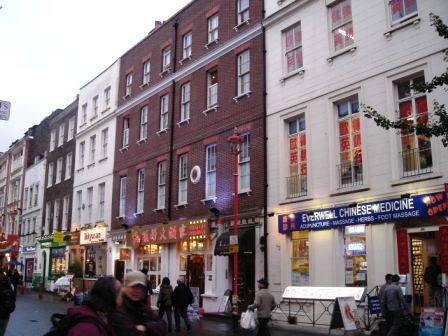
The streets of London Chinatown
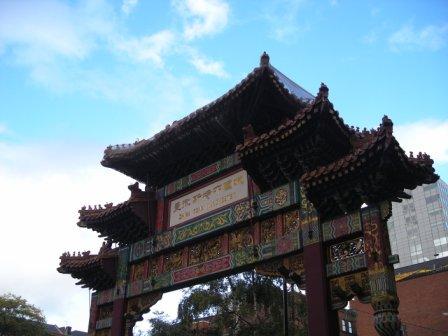
The archway of Manchester Chinatown

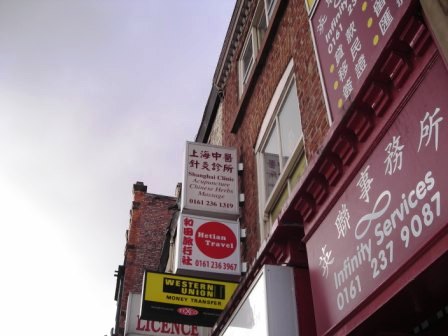
|

 Overseas Chinese in UK
Overseas Chinese in UK





